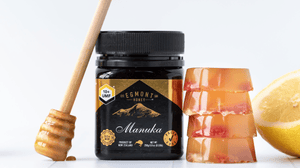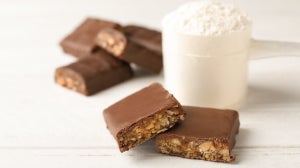
We’ve all experienced it at one point or another, that uncomfortable bloated feeling that follows after an especially large meal. With so many different reasons why we become bloated, there are also several different methods to try to combat it.
To help you beat the bloat, discover what bloating is, what causes it and our top recommendations of how you can reduce bloating through your diet and supplements.
What is Bloating?
Bloating happens when your digestive system is irritated, filling your stomach with excess gas. It may be due to an intolerance, where your gut struggles to absorb and digest specific foods.
You may feel a heavy, pressured feeling in your stomach that can lead to visible signs of an enlarged tummy. It’s often an uncomfortable feeling, causing cramps and making your waistband feel tighter.
What Causes Bloating?
Bloating is a sign that your stomach and digestive system contains more gas than usual. It is often a signal that your body is reacting to certain foods or intolerances.
Some causes of bloating include:
Gas-inducing foods
Drinking carbonated drinks
Stress
IBS
Food intolerances
Can Stress Cause Bloating?
You may be surprised to read that stress can cause bloating. As our gut health is intrinsically linked to our overall health and brain function, stress can impact your digestive system and upset your stomach, leading to slower digestion and bloating.
Reduce stress levels through a healthy diet and regular exercise, as well as practicing meditation or calming breathing techniques will help to keep your stress levels in check.
Foods That Cause Bloating
To help reduce your chances of bloating, consider avoiding or cutting down your consumption of these gas-inducing foods:
Legumes – including beans, chickpeas and lentils
Fizzy drinks
Processed, fatty foods
Dried fruit
Cruciferous veggies, such as broccoli and Brussels sprouts
Chewing gum – this causes excess intake of air and can lead to bloating
Sugar and artificial sweetener
Dairy – especially if you are lactose intolerant
Wheat – particularly for those with sensitivity to gluten
5 Foods to Reduce Bloating
One of the best ways to help reduce bloating is to eat more foods that support your gut health and avoid those that contribute to bloating – like those listed above. Discover a few of the key foods you can introduce into your diet to help beat the bloat:
1. Whole Grains
Full of protein, fibre, and antioxidants, whole grains are a fantastic food that can support your gut health and reduce bloating. Choose whole grains like oats, quinoa, and whole wheat products to get the most from these bloat-resisting foods.
2. High Fibre Fruit and Veggies
Be careful not to consume too much fibre as this can contribute to bloating. However, when eaten in moderation, foods rich in fibre can help to support your digestive system. This includes fruit and veggies such as strawberries, avocado, banana, apples, pineapple, cucumber, asparagus, and carrots.
3. Water
Flush out waste and keep your digestive system functioning normally by drinking plenty of water throughout the day to help reduce bloating.
4. Greek Yoghurt
Filled with friendly bacteria that can balance our gut health, yoghurt should be a staple in your diet to beat the bloat.
5. Fermented Foods
As you may know by now, fermented food is good for your gut. Kimchi, miso and kefir are all examples of gut-friendly foods as they contain good bacteria and aid your digestion, which in turn will help to reduce bloating.
Your “Beat the Bloat” Diet Plan
We know it’s tempting to skip a meal when you’re feeling bloated, but it’s still important to maintain a regular routine with your mealtimes. Make sure you have breakfast, lunch, and dinner, with added snacks in between if required. Check out our beat the bloat diet plan to help you get an idea:
Breakfast: Start your day with a bowl of porridge or protein overnight oats with added fresh fruit, such as bananas, blueberries or strawberries.
Lunch: Try preparing a quinoa salad with avocado, tomatoes, cucumber and leafy greens.
Snack: Fruit, yoghurt and organic breakfast bars are a great snack option to help curb hunger before your next meal. Or why not try making your own kefir smoothie?
Dinner: Serve up a veggie stir fry or opt for salmon, eggs, or sweet potato with a side salad. Make sure to steam your vegetables to help reduce the chances of bloating and ensure they don’t lose their nutritional content during the cooking process.









